European Tour: Appointing Keith Pelley signals new direction
- Published
- comments

The European Tour's new chief executive Keith Pelley has extensive experience in digital media
Somewhat incongruously, the European Tour chose the eve of a busy sporting weekend to announce a move of potentially far-reaching implications for the future running of golf.
Sporting attention was centred on upcoming football and rugby cup semi-finals, the latest round of Formula One and the end of an enthralling first Test in the West Indies.
Amid this feverish Friday afternoon, the appointment of Keith Pelley as the European Tour's new chief executive was revealed. It was barely noticed, but this shouldn't distract from the importance of the 51-year-old's appointment.
Indeed, such a typically busy weekend for sport illustrated perfectly a key challenge for Pelley and golf in general as it battles for attention in such a competitive sporting marketplace.
It will be the new man's job to ensure the European Tour remains relevant and is able to grow in significance in the coming years.
Although he doesn't have a golfing pedigree beyond a five handicap, the Canadian media mogul appears well qualified for the role.

Rory McIlroy (L), Paul Casey and Ian Poulter (R) all learned their trade on the European Tour but now play relatively limited events on their 'home' circuit
He has a strong history in sports administration and, just as significantly, the way that it is covered.
These will be key qualities in determining the direction taken by a Tour that has struggled in the recent global economic climate.
The Wentworth-based organisation has felt pressure from faltering European finances and an ever more powerful PGA Tour in the United States.
But it's an appointment that suggests the Tour is in bullish mood, with a desire to compete and develop rather than fall into some form of amalgamation with more powerful rivals.
Pelley's biggest objective is to ensure its future health by making its core product more relevant and accessible.
Fans and sponsors will not hang around if the European Tour doesn't meet these challenges head on.
It can't rely on a weekly diet of 72-hole strokeplay events that merely pitch up in whichever territory provides the backers for that week.
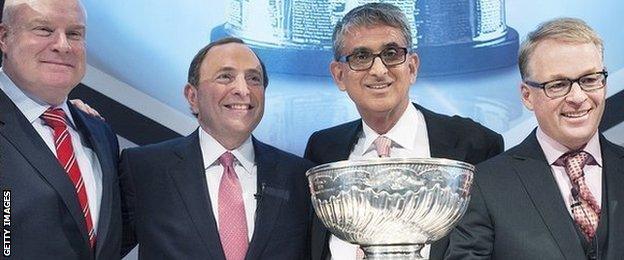
Keith Pelley was lauded for the 12-year NHL ice hockey media rights deal he negotiated
The process has to be more strategic. Tournaments need to resonate in the wider sporting community and meet the demands of local and international audiences.
This age of digital media provides a perfect opportunity and it therefore makes sense to appoint someone with considerable expertise and experience in this field.
Since his appointment just over a year ago, Tour chairman David Williams has sought to shake up a governing body that was able to boast around 40 years of continued expansion.
Williams' appointment of Pelley, who takes up the reigns in the summer in place of outgoing chief executive George O'Grady, signals a significant change of direction.
Williams was brought in at the behest of the players, who felt the Tour was losing out as its biggest stars relocated to America to enjoy richer pickings.
Europe had become a victim of its own success. The progress fostered by former chief executive Ken Schofield and his successor O'Grady helped create a raft of European stars capable of thriving on the American circuit.
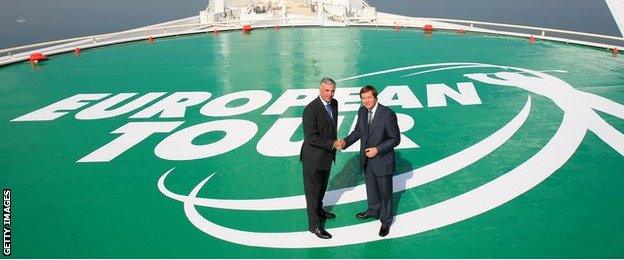
George O'Grady's biggest coup as European Tour chief executive was masterminding the Race to Dubai
Then, just as O'Grady was unveiling the lucrative Race to Dubai in 2008, the global economy crashed. The outgoing boss was left to manage the Tour in the toughest period it had ever faced.
Sponsors and tournaments were lost and far-flung co-sanctioned events in Asia and South Africa provided the only means to maintain the circuit. It was a time for mere survival rather than growth or strategic planning.
But that won't be enough going forward. Williams is convinced the product has to change and judging by Pelley's appointment he clearly believes it has to be imaginatively showcased as well.
Pelley is chairman of Rogers Media, external, a Canadian conglomerate that owns and runs a myriad of television and radio stations as well as scores of publications.
He negotiated a $5.2billion rights deal in NHL ice hockey and has been heavily involved with the Toronto Blue Jays baseball team.
He also headed up Canada's Olympic Broadcast Media consortium for the Vancouver 2010 Winter Olympics.
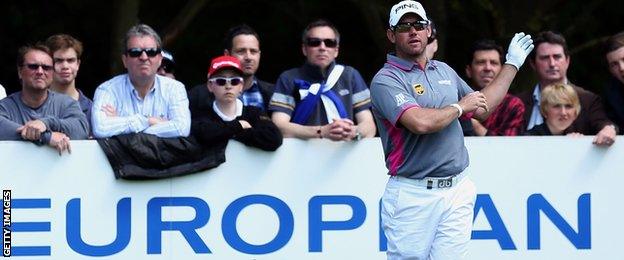
Lee Westwood was a European Tour stalwart before moving to warmer climes in America
So, business acumen more than golfing pedigree is the driving force behind Pelley's appointment.
Williams wants someone to change the way golf is portrayed and perceived, hence choosing a non-European with no golfing hinterland to run the continental game.
This is the latest in a series of significant appointments to the Tour's board.
Two influential businesswomen Jutta Af Rosenborg and Sophie Goldschmidt have already taken up roles as non-executive directors.
Af Rosenborg boasts considerable financial experience while Goldschmidt has worked in tennis, basketball and rugby union.
It feels as though there is something of a revolution taking place at the European Tour and while the appointment of Pelley was quietly understated, the effects may prove much noisier.
- Published20 April 2015
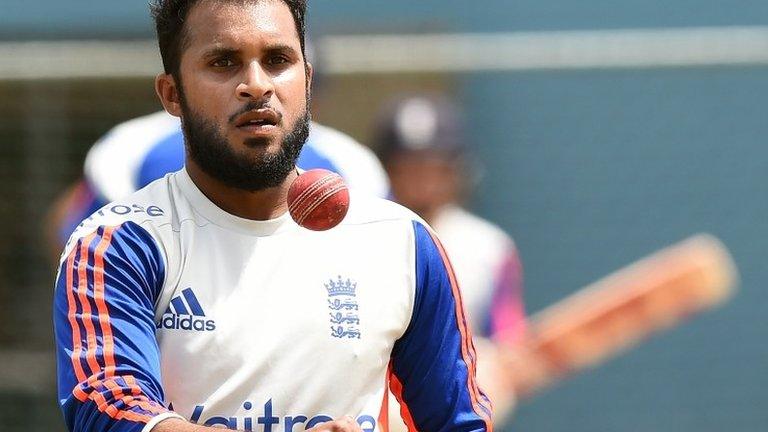
- Published21 April 2015

- Published28 September 2018
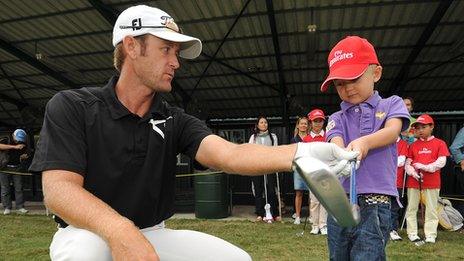
- Published19 July 2016
